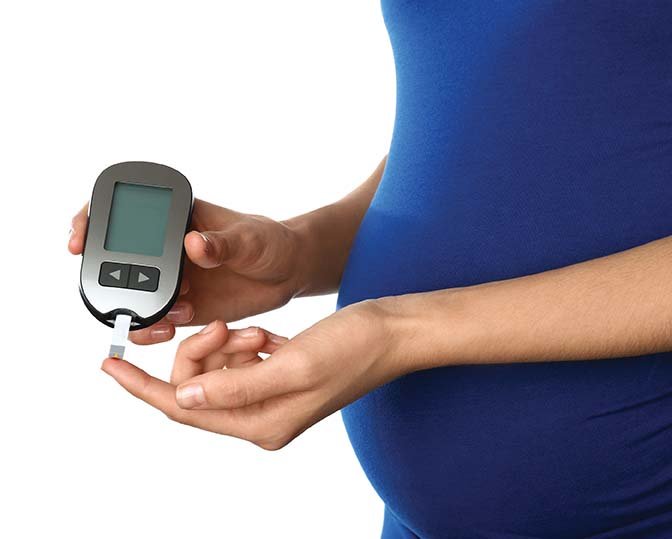
Pregnant woman checking blood sugar level with glucometer on white background. Diabetes test
Priscilla
Lynch reports on two new studies that could have implications for the
dietary management of gestational diabetes
A simple
Mediterranean-style diet in pregnancy does not reduce the overall risk of
adverse maternal and offspring complications, but has the potential to reduce weight
gain in pregnancy and the risk of gestational diabetes, according to the
findings of a new clinical trial (ESTEEM) led by Queen Mary University of
London and the University of Warwick, UK.
The results, published in the journal PLOS Medicine, show that having
a Mediterranean-style diet (including 30g of mixed nuts per day and extra
virgin olive oil) led to a 35 per cent lower risk of developing diabetes in
pregnancy, and on average 1.25kg less weight gain in pregnancy, compared to
those who received routine antenatal care.
The study suggests a Mediterranean-style diet could be an
effective intervention for women who enter pregnancy with pre-existing obesity,
chronic hypertension or raised lipid levels.
The multi-centre trial randomised 1,252 inner-city,
multi-ethnic pregnant women with metabolic risk factors (obesity, chronic
hypertension, or hypertriglyceridaemia) to a Mediterranean-style diet with high
intake of nuts, extra virgin olive oil, fruits, vegetables, etc (n=627) versus
usual care (n=625). Mediterranean diet participants received complementary nuts
and olive oil and specific dietary advice.
Researchers used an intention-to-treat (ITT) analysis
with multivariable models and identified the stratification variables and
prognostic factors a priori.
The primary end-points were composite maternal
(gestational diabetes or pre-eclampsia) and composite offspring (stillbirth,
small for gestational age, or admission to neonatal care unit) outcomes.
There was no significant reduction in the composite maternal
(22.8% vs 28.6%; adjusted odds ratio (aOR) 0.76, 95% CI 0.56-1.03: P=0.08) or
composite offspring (17.3% vs 20.9%; aOR 0.79, 95% CI 0.58–1.08: P=0.14)
outcomes.
There was an apparent reduction in the odds of
gestational diabetes by 35 per cent (aOR 0.65, 95% CI 0.47–0.91: P=0.01) but
not in other individual components of the composite outcomes.
Mothers gained less gestational weight (mean difference
-1.2 Kg, 95% CI -2.2 to -0.2: P=0.03) with intervention versus control.
Prof Shakila Thangaratinam from Queen Mary University of
London said: “This is the first study to show that pregnant women at high
risk of complications may benefit from a Mediterranean-style diet to reduce
their weight gain and risk of gestational diabetes.
“Implementing this diet seems to be effective and
acceptable to women. Current national dietary guidelines do not include the key
components of the Mediterranean-style diet in their recommendations. Women who
are at risk of gestational diabetes should be encouraged to take action early
on in pregnancy, by consuming more nuts, olive oil, fruit and unrefined grains,
while reducing their intake of animal fats and sugar.”
However, in a separate study, the assumption that
minimising weight gain in overweight and obese pregnant women is advantageous
for avoiding gestational diabetes has not been borne out. Indeed, it
might even be detrimental to the mother and the unborn child to restrict
carbohydrate intake during pregnancy, according to a recently-published study
in the leading journal Diabetes Care.
The recommended pregnancy-related weight gain for obese
women is 5-to-9kg, but many women greatly exceed these recommendations. In
order to explore the possibilities and indicators for avoiding
gestational diabetes in obese women, nutritional lifestyle
interventions involving 436 women were evaluated as part of the EU DALI project
(Vitamin D and Lifestyle Intervention for Gestational Diabetes).
The project involved coaching a group of obese pregnant
women to change their diet and to comply with five lifestyle measures: To
reduce their intake of soft drinks, to reduce their intake of rapidly-absorbed
carbohydrates and fat, and to increase their intake of protein and dietary
fibre. The control group made no changes to their eating habits. A second
group of women did regular physical activity and received corresponding advice.
The control group took no physical exercise.
Although the weight gain of those women who followed the
dietary advice was smaller, they also displayed higher fasting blood glucose
levels and a higher level of substances in the blood resulting from increased
fat breakdown, such as fatty acids and ketones. This also correlated with
reduced carbohydrate intake. Higher levels of free fatty acids were also found
in the blood of the newborn babies. No changes were found in these metabolic
markers in the other groups. However, according to the study, increased
physical exercise was just as unsuccessful in preventing
gestational diabetes as vitamin D supplementation.
In summary, it can be concluded that nutritional
interventions have a significant influence upon maternal and infant metabolism.
However, the advantage of smaller weight gain by restricting carbohydrates in
obese pregnant women simultaneously results in increased fat breakdown and the
associated release of free fatty acids into the blood of both mother and baby.
The consequences of this are not yet clear and need to be further
investigated.
Study co-author and endocrinologist Dr Alexandra
Kautzky-Willer said: “Gestational diabetes is the main risk factor
for type 2 diabetes in women following childbirth and also increases
the child’s risk via foetal programming. The development of preventive measures
both during and after pregnancy is an important goal in the fight to combat the diabetes epidemic.
“It could be that
low-carb diets are not ideal for pregnant women.”





Leave a Reply
You must be logged in to post a comment.